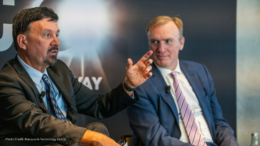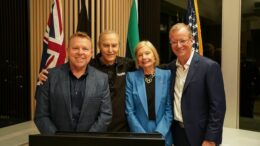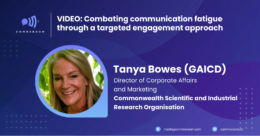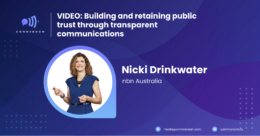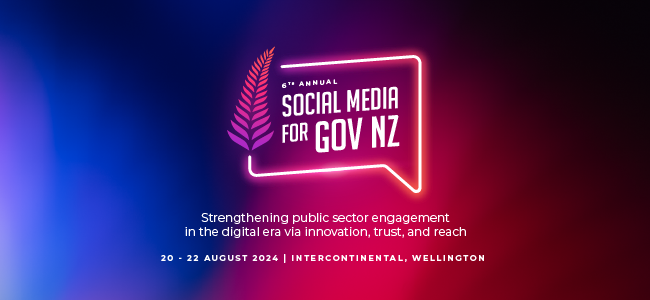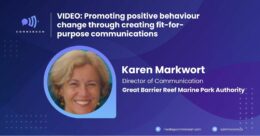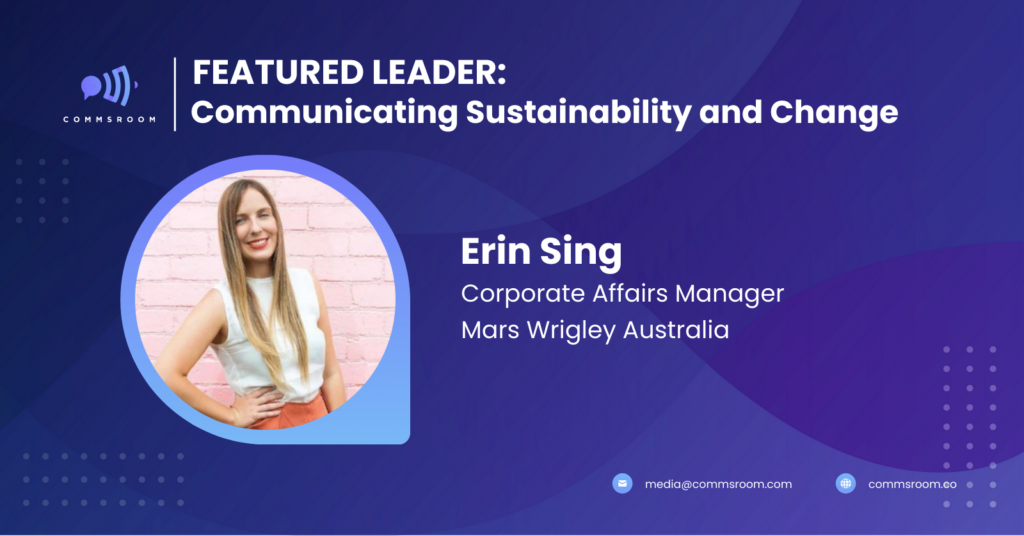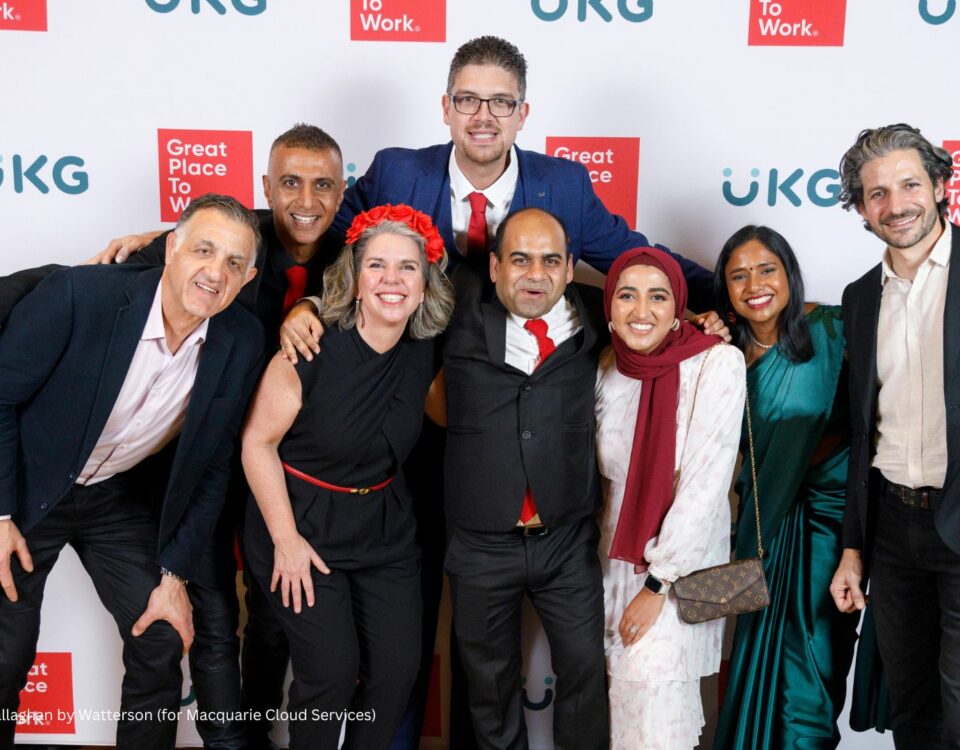At Mars Wrigley, we know that we have a responsibility to make change, we know that we have a responsibility to our consumers to make it easy for them to make better choices.
- Erin Sing is the Corporate Affairs Manager for Mars Wrigley Australia, where she leads a lean team of three and recently spearheaded the launch of Mars Wrigley’s switch to paper-based packaging.
- In this article, Erin illustrates the big impact that communications can have on several aspects of the business, and how even a small team can play a big role in the success of a global organisation.
- Erin will be speaking at the upcoming Comms and Social Media Summit 2023, where she will discuss the importance of convincing customers and internal stakeholders on the need for change.
You’ve had an extensive career in public relations and corporate communications. What made you choose this career path?
When I was thinking what I should study at uni, many, many moons ago, I was actually tossing up between PR and Comms, and Psychology. When I say that to people, they often think those are worlds apart.
But I think that kind of connection, that fabric that runs between them is what really led me to the career in comms. Comms involves a lot of psychology work, as it revolves around consumer behaviour, the way people behave, the way people think, the way people consume information and how that impacts individuals in different settings.
I decided to go down the comms path because I think there’s much more variety in that, which I think I’ve gotten a lot of in my career. From an agency perspective, you could be working on a financial services company or an ASX-listed telco company, and then over here, you’re doing a brand launch.
There’s this nice piece of variety that comes with comms. I’m really excited and interested and passionate about that human behaviour piece, and comms feeds into that quite well.
Can you give us an overview on what your daily workflow as Mars Wrigley’s Corporate Affairs is like?
I’m sure everyone answers this the same way. There really is no set day. That’s the thing as a comms person, no two days will really be the same and this is what excites and motivates us and gets us out of bed every morning.
We are quite a small team in Corporate Affairs for Mars Wrigley. We are a team of three, so we’re a highly efficient, high performing team that delivers really good work right across the board.
Given the role of Corporate Affairs within Mars Wrigley, we touch pretty much every single part of the business. We interface with marketing, our regulatory arm of the business, the supply and customers, and finance and then our executive team. It is a big role which means no two days are the same. You’ll be jumping into a giant project, such as our paper-based packaging, where that is pretty much months and months of just blinkers on and you’re focusing solely on that project which can be really good to just sink your teeth into something and look at it from all different angles.
At the moment, we’ve got a whole number of different projects that are going on that we’re jumping in and out of. We’re also doing a lot of advocacy work with policy makers or industry groups on certain topics through to talking to executives around. They might be doing keynote presentations where you’re briefing them on reputational issues and what they need to be aware of, the key messages, and more.
It is very varied. But in terms of being a team, we work efficiently in our high impact team which probably speaks to our workflow and how we work well together to create impact when there is only three of you.
What do you think about this emerging trend where comms teams are increasingly shrinking while the responsibilities are only growing?
It is an exciting time. The role is growing in terms of responsibility and influence within businesses, and the knowledge that the job entails now extends far beyond just straight communications.
At Mars Wrigley Australia, we’re finding sustainability is a really good piece for us. We play a really big role in that from a reputational perspective, regulatory, government relations — you start to pull in all of this additional expertise that you didn’t necessarily have before. From a personal development perspective and the impact you can have on the business, that’s the exciting part of it.
Securing executive buy-in is critical to all communications efforts. How do you measure the success and impact of your Corporate Affairs efforts within the company and in the broader community?
As we all know in Comms, there isn’t really a set way to really demonstrate ROI. It isn’t always clear-cut, and there’s always a lot of different things that can influence a commercial outcome. It can be definitely challenging.
The biggest and probably the best thing is to have relationships with the executive team and those key decision-makers. And it’s a long term play, making sure that you have those strong relationships and you’re building those relationships and demonstrating the value of what you offer. We’re quite lucky at Mars Wrigley that even though our Australian team is quite small, globally, Mars Wrigley has quite a well-structured corporate affairs team.
We also use tools such as RepTrak to measure our reputation which I find is a great tool when you can pinpoint your reputation against key competitors. And if you’re showing that to key decision makers they can see that some of your competitors are ahead of you from a reputational perspective, you can really drill down on that, which helps to sway decisions.
The case study that you’re presenting at the Comms and Social Media Summit 2023 delves into your communications strategy for engaging customers in Mars’ switch to paper-based packaging. How important is it to convince customers and internal stakeholders on the need for change?
It’s very important. I think particularly now, with the way the general public and society is, we have a broad understanding from a sustainability perspective that we all need to do more as everyday people. We need to make key decisions in our lives to lessen our impact on the environment and the climate.
At Mars Wrigley, we know that we have a responsibility to make change, we know that we have a responsibility to our consumers to make it easy for them to make better choices.
One of the key decisions around our paper-based packaging was, “how do we make this packaging easy for our consumers to recycle?” We know that people eat them on the go, they may not be able to store them and be able to return them back to store when Redcycle was available. Other than that, there’s only a handful of soft plastic recycling schemes in varying councils across the country. It was like, “how do we make this easy?”
That was the key component: we had to make sure this packaging was compatible with the recycling infrastructure that we have right now. With those sorts of key decisions, it’s about thinking about who your end audience is, which again comes back to Comms and its consumer behaviour piece and understanding how people behave and how they want to be communicated to.
From an internal perspective, we had a really strong commitment to sustainability. Globally, we’ve donated a billion dollars to a sustainable regeneration program, which is a global program that looks at all aspects of our business, from packaging through to carbon, through to one ingredient sourcing. It’s a very big and well-thought-out program.
So our associates are already on that journey with us, but we needed to be able to sell this business case as to why we had to do it now. Part of that was looking at what is the need in the market, what’s the opportunity in the market, where can we differentiate ourselves from our competitor. We also worked with our customers and our key retailers to understand what their sustainability goals are and how the work that we’re doing can help shape that.
We led this project globally, for Mars Wrigley, so our associates from our factory, RND team, and our manufacturing team has had like three years of trials to bring this to life. They were testing different packaging, different machinery. It was a whole big process.
There’s a whole heap of work that our team did internally. So it’s about you bringing them on that journey and getting them excited by being on that journey to be able to pioneer this kind of work globally.
It is about constant communication internally particularly with employees and up the chain across Mars Wrigley globally so they’re equally as excited about what we’re doing, and they have visibility over what we’re doing and can see the progress that we are making.
Are there any recent developments or upcoming projects that you are particularly excited about in the realm of Corporate Affairs at Mars Wrigley Australia?
I know I’ve spoken about it a fair bit but sustainability is a really big focus for us as Mars Wrigley. We are working on a number of different packaging changes that are more sustainable. We also announced our commitment to Net Zero by 2050 so we are making some really strong strides there at the moment and we’re gonna have a campaign later this year that really focuses on our commitments and what we’re doing and utilising our brands to tell those stories.
Erin will be speaking at the Comms and Social Media Summit 2023. Catch her session by registering your slot today.





